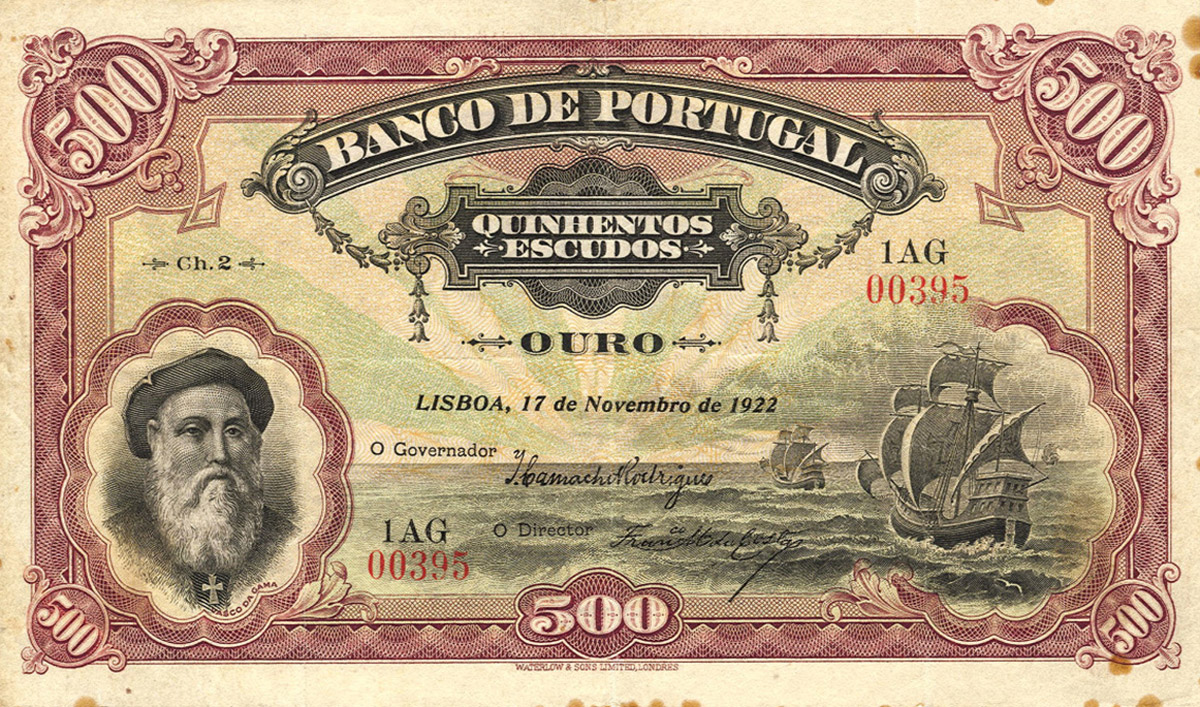Break the Bank

An official five-hundred-escudo bill printed by Waterlow & Sons, London, in 1922. Courtesy Mike Jowett.
As long as reputable sovereign and financial entities have issued value-bearing notes, disreputable personages have attempted to imitate them for nefarious purposes. At times the counterfeiters have been nearly as productive as the legitimate mints. In the mid-nineteenth century, some 40 percent of all American currency was fake. But “fake” here is a relative term. With literally thousands of currencies circulating at the time, legal tender in Cincinnati might be little more than tinderbox fodder in Columbus. National currencies, too, often ended up stoking the auto-da-fé; those of the French Bank Royale, the Continental Congress, and the Confederate States are only the most notorious examples. Under such turbulent circumstances, the difference between value and valuelessness, between “real money” and ornate scrap paper, does not admit of definite boundaries.
Perhaps no one has challenged this distinction more effectively than the forgotten Portuguese entrepreneur and swindler Arturo Alves Reis. The latter epithet, though certainly apt, fails to capture the true essence of his crimes, which were both outlandishly reckless and touchingly devoid of malice. Producing wealth ex nihilo, Alves Reis was as much alchemist as con man. His specialty was spinning fictions that opened out onto the real, then closed behind him once he passed through. His career began early. Just after his twentieth birthday, in 1916, Alves Reis lit out for the Portuguese colony of Angola to make his fortune. In addition to a plump new bride, he brought with him a homemade diploma from the nonexistent Polytechnic School of Engineering of Oxford University.
This diploma certified his mastery of the subjects of geology, geometry, theoretical and applied physics, metallurgy, paleography, and mathematics, as well as civil, mechanical, and electrical engineering. The sole genuine mark on the document was a notary seal. As the only Oxford graduate in Angola, Alves Reis soon found himself running the country’s rail system, an occupation he discharged with considerable alacrity, diagnosing mechanical failures in engines he had never seen before. Such success must have encouraged him: told by real engineers that some new equipment was too heavy for the trestles, he tested it himself, bringing his infant son along in flamboyant demonstration of his self-confidence. In short, Alves Reis did his invented alma mater proud.
Nest egg in pocket, Alves Reis returned to Lisbon in 1923 and went into business in a curiously non-specific way, buying and selling, exporting and importing whatever came his way. He soon met with his second opportunity to use fiction in pursuit of the real. Learning that a controlling interest in the Royal Trans-African Railway Company of Angola could be had for a mere forty-thousand dollars (which represented only a fraction of its cash reserves), Alves Reis engineered a “leveraged buy-out” avant la lettre: He kited a US check to buy the company, raided their coffers, and wired forty-thousand dollars of their own money to New York before the boat bearing his check could arrive at dock. An efficient scheme indeed, but when some influential members of the railway’s board ratted him out, he was tossed into an Oporto jail. A gross error on the part of the Portuguese authorities: they gave Alves Reis time to think. And what he thought about was the Bank of Portugal.
Reading through the bank’s bylaws, Alves Reis made some interesting discoveries. First, it was semiprivate; the government held only a minority stake in the operation. Second, it had the exclusive right to issue Portuguese bank notes. Last but not least, no one was in charge of monitoring duplicate serial numbers. After fifty-four days of confinement, he emerged from jail with an utterly ludicrous plan the likes of which no self-respecting criminal could ever have conceived. It was not so much half-baked as inherently inedible. Alves Reis cobbled together a contract that specified that he, as a supposed agent of the Bank of Portugal, was authorized to request the printing of five million dollars in Angolan currency to be paid to an “international group of investors” in exchange for a loan to the Angolan government for the same amount in British sterling.
After a night of cutting and pasting, Alves Reis took his contract over to a notary, whose assistant stamped his signature without a second glance. He then obtained the seals of the French, German, and English consulates, each attesting to the authenticity of the notary’s signature. The bureaucrats’ complicity seems to have had no more ulterior a motive than that they enjoyed stamping things.
With contract in hand, Alves Reis now rounded up his consortium of “international investors.” He basically chose the only foreigners he knew, but he could not have done better had he gone straight to central casting at Warner Brothers (indeed, the entire secondary cast of Casablanca could have found roles in a film version of this scheme).
His co-conspirators were: Antonio Bandeira, a Portuguese diplomat posted in Holland, with the obligatory pile of gambling debts; his corrupt, skirt-chasing younger brother José, who had done time for grand larceny; a social-climbing Dutch importer named Karl Marang; and Adolf Hennies, an ostensibly respectable German financier with a shady background in war profiteering. Believing Alves Reis to be the front man for a cabal of corrupt officials out to shore up both their own and Angola’s finances, the group vowed complete secrecy as a requisite to participation in the scheme. ...MORE